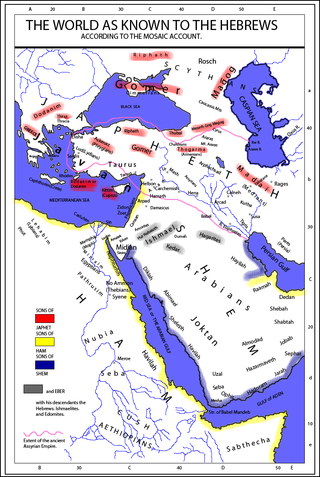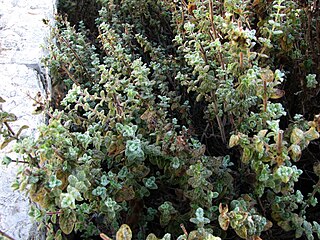
Benjamin was the last of the two sons of Jacob and Rachel in Jewish, Christian and Islamic tradition. He was also the progenitor of the Israelite Tribe of Benjamin. Unlike Rachel's first son, Joseph, Benjamin was born in Canaan according to biblical narrative.
The Book of Exodus is the second religious book of the Bible. It is a narrative of the Exodus, the origin myth of the Israelites leaving slavery in Biblical Egypt through the strength of their deity named Yahweh, who according to the story chose them as his people. The Israelites then journey with the legendary prophet Moses to Mount Sinai, where Yahweh gives the 10 commandments and they enter into a covenant with Yahweh, who promises to make them a "holy nation, and a kingdom of priests" on condition of their faithfulness. He gives them their laws and instructions to build the Tabernacle, the means by which he will come from heaven and dwell with them and lead them in a holy war to conquer Canaan, which has earlier, according to the myth of Genesis, been promised to the "seed" of Abraham, the legendary patriarch of the Israelites.
The Book of Genesis is the first book of the Hebrew Bible and the Christian Old Testament. Its Hebrew name is the same as its first word, Bereshit. Genesis is an account of the creation of the world, the early history of humanity, and of Israel's ancestors and the origins of the Jewish people.

The Torah is the compilation of the first five books of the Hebrew Bible, namely the books of Genesis, Exodus, Leviticus, Numbers and Deuteronomy. It is known as the Pentateuch or the Five Books of Moses by Christians. It is also known as the Written Torah in Jewish tradition. If meant for liturgic purposes, it takes the form of a Torah scroll. If in bound book form, it is called Chumash, and is usually printed with the rabbinic commentaries.

The Samaritan Torah, commonly called the Samaritan Pentateuch, is a text of the Torah written in the Samaritan script and used as sacred scripture by the Samaritans. It dates back to one of the ancient versions of the Hebrew Bible that existed during the Second Temple period, and constitutes the entire biblical canon in Samaritanism.
The ancient town of Riblah, today a tell covered by a cemetery not far from the town of Ribleh on the Syrian side of the border with Lebanon, was in biblical times located on the northern frontier of the land of Canaan. The site lies on the eastern bank of the Orontes river, in a wide and fertile plain, 35 miles north-east of Baalbek and 10 or 12 miles south of the artificial Lake Homs created by the Romans. Brenton translated the place as Rablaam in his translation of the Septuagint.

The Generations of Noah, also called the Table of Nations or Origines Gentium, is a genealogy of the sons of Noah, according to the Hebrew Bible, and their dispersion into many lands after the Flood, focusing on the major known societies. The term nations to describe the descendants is a standard English translation of the Hebrew word "goyim", following the c. 400 CE Latin Vulgate's "nationes", and does not have the same political connotations that the word entails today.

Abraham ben Meir Ibn Ezra was one of the most distinguished Jewish biblical commentators and philosophers of the Middle Ages. He was born in Tudela, Taifa of Zaragoza.

Saʿadia ben Yosef Gaon was a prominent rabbi, gaon, Jewish philosopher, and exegete who was active in the Abbasid Caliphate.
Mizraim is the Hebrew and Aramaic name for the land of Egypt and its people. It is ascribed to one of the sons of the Biblical figure Ham.
Ludim is the Hebrew term for a people mentioned in Jeremiah and Ezekiel. In the Biblical Table of Nations Genesis 10:13 they were descended from Mizraim. The biblical scholar Victor P. Hamilton believes that the available evidence "suggests" that the Ludim are the Lydians.

Caphtor is a locality mentioned in the Bible, in which its people are called Caphtorites or Caphtorim and are named as a division of the ancient Egyptians. Caphtor is also mentioned in ancient inscriptions from Egypt, Mari, and Ugarit. Jewish sources placed Caphtor in the region of Pelusium, though modern sources tend to associate it with localities such as Cilicia, Cyprus, or Crete.
The Book of Jasher, which means the Book of the Upright or the Book of the Just Man, is a lost book mentioned in the Hebrew Bible, often interpreted as a lost non-canonical book. Numerous forgeries purporting to be rediscovered copies of this lost book have been written. A different interpretation identifies it as a reference to the Pentateuch, an interpretation which is notably favoured by the Jewish scholar Rashi in his commentary on the Hebrew Bible.

Gerar was a Philistine town and district in what is today south central Israel, mentioned in the Book of Genesis and in the Second Book of Chronicles of the Hebrew Bible.
The genealogies of Genesis provide the framework around which the Book of Genesis is structured. Beginning with Adam, genealogical material in Genesis 4, 5, 10, 11, 22, 25, 29–30, 35–36, and 46 moves the narrative forward from the creation to the beginnings of the Israelites' existence as a people.
Anamim is, according to the Bible, either a son of Ham's son Mizraim or the name of a people descending from him. Biblical scholar Donald E. Gowan describes their identity as "completely unknown."

The Casluhim or Casluhites were an ancient Egyptian people mentioned in the Bible and related literature.
Samuel ben Hofni. He was the Gaon of Sura from 998 to 1012.

Ezov is the Classical Hebrew name of a plant mentioned in the Bible in the context of religious rituals. In some English-language Bibles, the word is transliterated as ezob.









